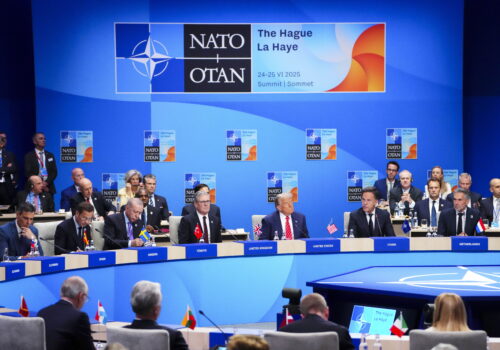Since taking office, US President Donald Trump has upended transatlantic relations. Perhaps most significantly, he has called into question the United States’ role as the “guarantor” of peace on the European continent. Yet, at the same time, US actions and rhetoric calling for Europe to do more to defend itself have sparked genuine action on the continent. European leaders now appear determined to reimagine the continent’s agency and reduce its reliance on Washington for defense.
The US-Europe relationship may be somewhat tense at the moment, but Washington should pay attention and applaud the proposals coming out of Europe to take more ownership of European defense. This includes the idea for a new intergovernmental organization called the European Defence Mechanism (EDM) to help finance the continent’s rearmament.
The proposal originated from a report written by the Brussels-based think tank Bruegel, following a commission by the Polish presidency of the Council of the European Union (EU). It was reportedly a topic of intense debate at an April meeting of EU finance ministers—signaling European leaders’ increased willingness to take on more responsibility for Europe’s rearmament. While some ministers were hesitant to consider a new defense tool, many showed interest.
What’s in the plan
The big question in European defense is how Europe should address its spending and capability gaps. In its April 7 report, Bruegel laid out one possible solution in the form of the EDM. The mechanism would focus on joint procurement across a single European defense market. Notably, this proposal reflects a similar idea discussed among British officials earlier this year for the creation of a “supranational bank” for joint European defense purchases. The EDM would use funds from its members to finance the joint procurement of weaponry, including for the acquisition of strategic enablers, and make loans to member states. To fund these activities, the EDM would be empowered to borrow on capital markets.
The Bruegel plan represents a step forward in addressing well-documented challenges to European security. Currently, the European defense landscape is largely divided along national lines, creating high prices where markets are small. Weapons stockpiles are low, and countries too often do not coordinate purchases. The EDM would help create a single market for defense on the continent and allow Europe to take advantage of economies of scale. It would also shift the financial burden of borrowing away from member states, allowing the EDM to acquire costly defense materials and keep debt on its own books. While the EU has made recent attempts to add flexibility to its fiscal rules for defense spending, this arrangement may be an attractive alternative for heavily indebted countries seeking to avoid rising debt levels. On top of these advantages, the EDM would allow for the participation of countries outside the EU, such as the United Kingdom.
If the plan were adopted in its current form, the EDM would become the official embodiment of the “coalition of the willing.” It would allow European democracies, whether part of the EU or not, to voluntarily join a framework governed by rules that are better suited to addressing challenges facing the European security landscape. Nations would be prohibited from using national bias in defense procurement, thereby eliminating the exception in EU law that allows countries to prioritize their own national defense initiatives at the expense of consolidating the European single market for defense.
What it might mean for the United States
The potential downside for the United States remains the same issue that has plagued European defense plans for years: a single market for European defense procurement would likely lead officials across the continent to prioritize European defense contractors over US firms. The current proposal stipulates that in most cases, the EDM could only procure weapons from defense contractors located in EDM member countries.
Politicians in both parties in Washington have sharply criticized this potential exclusion. This concern has bubbled up before: during US President Donald Trump’s first administration, as the EU moved to establish its Permanent Structured Cooperation initiative, the White House objected to what this would mean for US firms. But times have changed: Washington cannot reasonably expect Europe to step up its capabilities and increase its reliance on a United States that has shown its priorities are elsewhere.
Furthermore, the EDM would not fully exclude US firms. Under the proposal in the Bruegel report, if the EDM board were to choose to do business with a defense contractor in the United States, then it could do so through a “majority” or potentially a qualified majority vote. To be sure, this would add an additional hurdle to clear, but it would not completely bar US companies from the market.
What’s more, the EDM project fits into Washington’s strategic thinking. By facilitating purchases on a larger scale, the EDM would give European countries the power to jointly procure capabilities operated by the United States. Currently, European countries largely depend on the US command in NATO to provide them with access to strategic enablers, including strategic air defense and lift systems, satellite communications, and command-and-control capabilities. These enablers are expensive to acquire, yet they are necessary to carry out any large-scale coordinated action. With its greater purchasing power, the EDM would potentially have the capacity to buy and own strategic enablers, build European capabilities, and free up US capabilities for other priorities. The EDM is not a tool for Europe to move beyond NATO; it’s one to fortify European security within the Alliance.
The plan for the EDM remains a blueprint for now, but it provides an invaluable insight into European defense planning amid the changing transatlantic relationship. The European Union and its member states need to take ideas such as these, which facilitate the strategic independence of the continent, and put them into action.
For its part, Washington should recognize the fresh ideas that are coming out of Europe and embrace them. A US endorsement of bold proposals for European defense such as the EDM can help Europe build momentum to adopt them and make real progress on taking more responsibility for its defense. Until then, rhetoric from Washington on its support for greater European self-reliance will be just that.
Katherine Johnson is a former young global professional with the Atlantic Council’s Europe Center.
Further reading
Wed, Jun 25, 2025
Experts react: NATO allies agreed to a 5 percent defense spending target in a low-drama summit. Now what?
New Atlanticist By
The Alliance summit was notable for what was said and done, especially about defense spending—but also for what was left off the agenda.
Thu, Jun 5, 2025
Ukraine just gave us a glimpse into the future of European defense
Inflection Points By Frederick Kempe
European allies need both military capabilities and technological innovation to deter Russia, as Ukraine’s recent drone strikes on Russian air bases underscore.
Wed, Jun 4, 2025
The UK Strategic Defence Review lays out an ambitious roadmap for reform. Will the government deliver?
New Atlanticist By AM Sir Christopher Harper, KBE, RAF (Ret.)
The review is a positive step toward revitalizing the United Kingdom’s defense posture, but its success will depend on funding and follow-through.
Image: Servicemen cover the arrival of tanks as they exercise ability to cross armored vehicles through Vistula river on ferries during NATO's Dragon-24 exercise, a part of large scale Steadfast Defender-24 exercise in Korzeniewo, Poland on March 4, 2024. Photo by Dominika Zarzycka/NurPhoto via Reuters.



